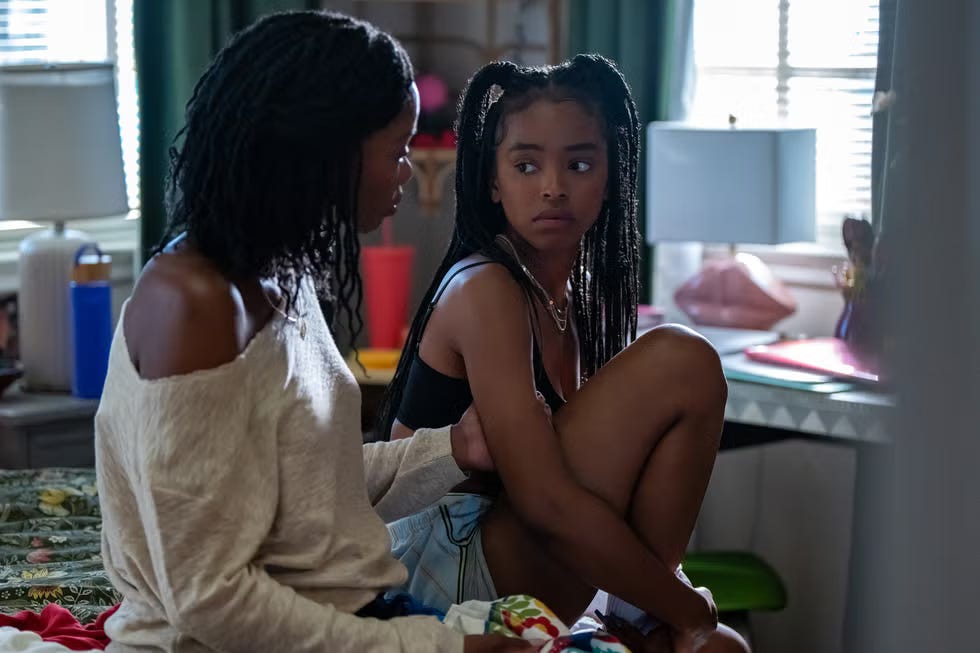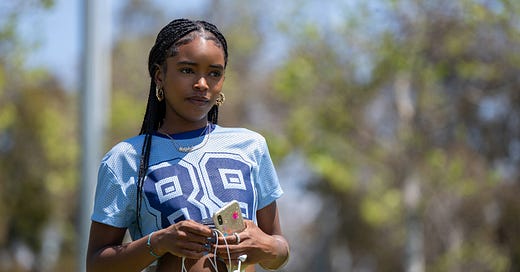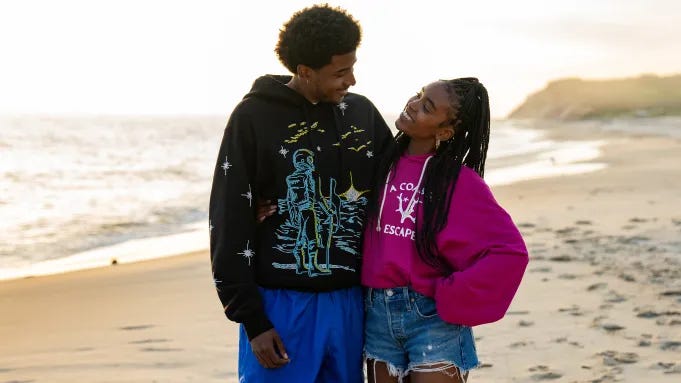A love letter to Keisha Clark and Black girls dealing with shame
As Black girls, we learn to put on masks for survival early. But we deny our pain in doing so.
Watching Keisha Clark in “Forever” reminded me of when I became so good at running.
It was definitely in high school. Dodging judgments, gossip, and scandal while vying for my parents’ approval and a future in college. Pre-adulthood is tricky, clumsy and awkward, especially when you’re carrying the weight we see Keisha (Lovie Simone) hold.
In the first half of Mara Brock Akil’s Netflix adaptation of the Judy Blume book, we’re introduced to the Los Angeles teen through the eyes of her childhood sweetheart, Justin Edwards (Michael Cooper Jr.). They reconnect at a house party during winter break when Keisha recognizes Justin from elementary school. The couple floats as they stretch their New Years kiss into flirtatious plans for the following day. It’s after their frisky movie date comes to an abrupt halt that we learn what feels so heavy on her shoulders.
It’s the disproportionate gravity that aims to pull Black girls down faster and harder at the tailend of a mistake. It’s the overbearing communal and familial responsibility that consumes them as they live life for others first, themselves second. It’s the restraints that tell them that freedom and contentment only come from overachieving. And not to mention the unforgiving angst and hormonal roller coasters that come with being a teenage girl.
After her ex-boyfriend, Christian (Xavier Mills), leaked a sextape that quickly went viral, Keisha spun a web of lies. Ones that she believed would protect her, her mom and her future career as a Howard Bison.
When she needed help the most, she sacrificed herself, instead. Shame carried her away from a full-ride at her old school to what she believed was a fresh start at an all-girls academy. Afraid to disappoint her village — especially her mom (Xosha Roquemore) who stressed the negative consequences of sex — Keisha kept up lies to keep her family’s image of her intact. The guilt led to her her budding relationship with Justin and going to prom with the same boy who leaked their tape.
Keish made a mistake but the position she’s in is not her fault. Yet she’s taking the bulk of the responsibility and embarrassment stemming from it because of sexism. This isn’t new for women and it damn sure isn’t new for Black women. Starting at age five, Black girls begin to be adultified by those around them. Consider on top of that the stigmas placed around Black women and sex that label us jezebels solely for having full lips and a curve to our hips.

My heart went out to Keisha as if she wasn’t fictional. Because the message behind her story is not. I see myself, my friends, my mom and so many other Black women in Keisha. Breaking our backs to defy stereotypes while still fitting into the box of expectations our community often puts us in. People pleasing for our mother’s sake despite the pain it causes us. Walking a tightrope because society tells us that we’ll fall if we don’t.
Like Keisha, I sought to get out of my hometown of Dayton, Ohio for a better future at Howard. For a while, it was the only thing really carrying me. My college dreams and time on the basketball court were the only things keeping me sane. But my home life was rough and I deemed it too embarrassing to talk about. So I lied to my friends about why they couldn’t come over or why I kept cycling through the same three pairs of jeans for out of uniform days and weekend outings. I entered Howard with bad habits. The funny thing about shame is that it can run as fast as you until you confront it. I got so good at hiding that it took my 27th birthday (and copious amounts of therapy) for me to realize the weeds I had cultivated in my life’s garden.
For several episodes, we only see Keisha light up when Howard or Justin are the topic of discussion. Howard represents hope for a better future and Justin represents a love she can bask in now. In some ways, these two are keeping her afloat. But it's Keisha who has to, and eventually decides to, save herself. Though Justin’s mom (Karen Pittman) pushes her to do it with an ultimatum, it’s still Keisha who decides to painfully and courageously tell her mom the truth and embark on a new chapter of healing.
The most beautiful thing about this series to me isn’t just that it’s a story about young Black love — and I’m a sucker for a good romance. It’s also a coming of age story about Black adolescence. Keisha learns to push through and not hide her pain, thus, fully stepping into her light. That’s one of the most glorious decisions that we can embrace at any age.
“Forever,” which just got renewed for Season 2, is a reminder of how much power over our destiny we truly have and how much grace we owe ourselves, even in our lowest moments.
And not for nothing, I’m rooting for Keisha and Justin to rekindle their relationship without reaching for the block button in their college years.
Like my writing? Good! I do a lot of it. Most recently with Essence, Refinery29 and ContrabandCamp Check what I’ve been up to lately:
We owe so much to Cassie and victims of abuse. (Refinery29)
Kennedy Ryan’s Books Redefine ‘Happily Ever After’ For Black Women (Essence)






I loved this! I also saw myself in Keisha and was glad she was loved softly by Justin. It felt good to see her be relieved of some of her shame, though she is fictional I feel like she got some intervention earlier than most of us did! Love your writing!
This is beautiful and eloquently written and as a Kisha all of these words apply to me as well.